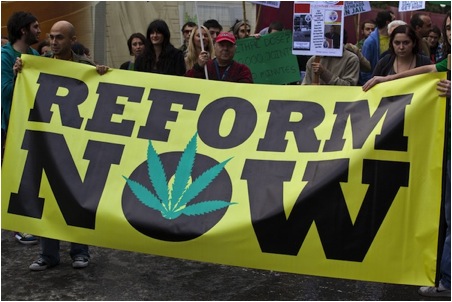Global News Post published an article on the good of the War on Drugs. The authors of this post argue that prohibition of certain drugs such as marijuana or alcohol for example, create a bigger problem. Jeffrey Miron, a Harvard lecturer writes, “Prohibition creates violence because it drives the drug market underground. This means buyers and sellers cannot resolve their disputes with lawsuits, arbitration or advertising, so they resort to violence instead.” He then proceeds to add, “Violence results from policies that create black markets, not from the characteristics of the good or activity in question.”
They unfairly use the U.S. national debt cost and prison rates in their favor to essentially explain the benefits for this war on drugs. The authors write of how prohibition would cost taxpayers dearly due to prison expenses, all the while education falls. Bringing up monetary values such as the amount of money taxpayers would save if the U.S. taxed them like tobacco or alcohol products is just a feeble attempt to persuade a reader using pathos. There is no true logical argument in this entire argument. Another appeal to pathos is how the article states that the U.S. has forcefully made countries like Egypt and Cambodia, who have long had traditions of smoking marijuana for example, ban that drug. This is supposed to make a reader feel bad for these other countries and want the U.S to change. However, in my opinion, these are all emotional appeals that garner a quick reaction without truly looking at the facts.
Another source I came across that was similar to this Global Post article was on Taki’s Magazine. Some of the arguments for not banning drugs is the nature of the criminals that engage in illegal drug activity. The magazine states, “Their [drug dealers] violation of the drug laws is not so much an expression of their natural rights as it is the manifestation of their naturally anti-social characteristics.” Other arguments include that before the drug war began, there were less SWAT and police shootings. They also argue that the reason for all the steam this war on drugs receive is because it is much harder to It’s much harder to prove burglary, rape, and murder than it is to prove a drug offense. This kind of thinking makes an argument not credible. One cannot deem which crimes are more difficult to process and use that as a reason for disbanding such a heavy topic.
Throughout all of this however, I was able to come across arguments that greatly refuted majority of the claims made by these pervious sources. This came from one of my favorite sources in Counter Punch. They laid out numerous benefits to the war on drugs included but not limited to the following: “Via programs like DARE, it has turned kids into drug informants who monitor their parents for the authorities” and “It has enabled local police forces to undergo military training, create paramilitary SWAT teams that operate just like the U.S. military in an occupied enemy country, get billions of dollars’ worth of surplus military weaponry.”
Overall, these arguments, though rich in text, the content seems to draw solely on the emotional effects it has on readers. These appeals are aimlessly attempting to drive a wedge between what we as a country need and what we have, falsifying information that makes at look at the wrong picture.
